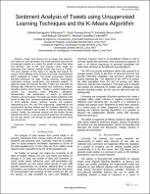Sentiment Analysis of Tweets using Unsupervised Learning Techniques and the K-Means Algorithm

View/
Author(s)
Iparraguirre-Villanueva, Orlando
Guevara-Ponce, Victor
Sierra-Liñan, Fernando
Beltozar-Clemente, Saul
Cabanillas-Carbonell, Michael
Date
2022Metadata
Show full item recordPublisher
SAI The Science and Information Organization
Journal
(IJACSA) International Journal of Advanced Computer Science and Applications
Abstract
Abstract: Today, web content such as images, text, speeches, and videos are user-generated, and social networks have become increasingly popular as a means for people to share their ideas and opinions. One of the most popular social media for expressing their feelings towards events that occur is Twitter. The main objective of this study is to classify and analyze the content of the affiliates of the Pension and Funds Administration (AFP) published on Twitter. This study incorporates machine learning techniques for data mining, cleaning, tokenization, exploratory analysis, classification, and sentiment analysis. To apply the study and examine the data, Twitter was used with the hashtag #afp, followed by descriptive and exploratory analysis, including metrics of the tweets. Finally, a content analysis was carried out, including word frequency calculation, lemmatization, and classification of words by sentiment, emotions, and word cloud. The study uses tweets published in the month of May 2022. Sentiment distribution was also performed in three polarity classes: positive, neutral, and negative, representing 22%, 4%, and 74% respectively. Supported by the unsupervised learning method and the K-Means algorithm, we were able to determine the number of clusters using the elbow method. Finally, the sentiment analysis and the clusters formed indicate that there is a very pronounced dispersion, the distances are not very similar, even though the data standardization work was carried out.
Type
info:eu-repo/semantics/article
Rights
info:eu-repo/semantics/openAccess
Language
eng
Collections
- Ingeniería de Sistemas [330]

